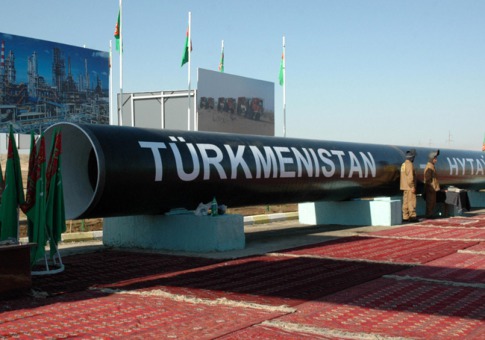The Minister of Economy of Turkey, Mustafa Elitas, called the Turkmen market promising for Turkish business. Ankara is searching for opportunities to compensate for the loss of the Russian market. The losses from sudden worsening of relations with Moscow turned out to be more significant than Ankara had thought. Talks on extension of economic cooperation have already been held between Ankara and Kazakhstan and Kyrgyzstan.
“Turkmenistan has a favorable investment climate and there are all the necessary conditions for a successful business partnership,” Mustafa Elitas said at the talks with President Gurbanguly Berdimuhamedow, as a result of the business forum and the exhibition fair of Turkish goods in Ashkhabad. More than 200 representatives of the Turkish official structures, major businessmen, including heads of about 100 companies, who were interested in development of the partnership with Turkmenistan, participated in the exhibition. Berdimuhamedow and Elitas shared their views on the situation and the prospects of the bilateral relations, stressing broad opportunities for diversification of effective trade and economic contacts, extension of the spectrum of trade turnover, and implementation of joint projects. According to the leader of Turkmenistan, “Ashkhabad is interested in an inflow of Turkish capital into the national economy.”
Turkish business arrived in Turkmenistan in the 1990s. Calik Group Holding was the first company which started projects in the sphere of light industry and later occupied other economic spheres, including construction. For example, Calik Group constructed three TPP in Turkmenistan (Akhal, Lebal, Mari). Today more than 600 Turkish companies are working in Turkmenistan. According to Berdimuhamedow, major projects are implemented by them such as construction of the international sea port in the city of Turkmenbashi, the international airport of Ashkhabad, highways, road junctions, and so on.
Broad trade and economic contacts between Turkmenistan and Turkey don’t need advertising. Their trade turnover exceeds $6 billion. By the way, the trade turnover between Russia and Turkey reduced by $24 billion. Earlier it was planned to increase the index up to $100 billion. Now the whole potential has to be redirected to the neighbors, including the Central Asian countries such as Turkmenistan. “It should be said that Russia didn’t export much to Turkey; the trade turnover included exports of Russian gas, primarily,” Shohrat Kadyrov, PhD (History), the leading scientist of the Center for Studying General Problems of the Modern East at the Institute of Oriental Studies of the RAS, told Vestnik Kavkaza.
He says that the situation is different in Turkmen-Turkish relations. In Turkmenistan, the whole construction industry, the whole textile industry, transport, the energy sphere and convenience goods depend on Turkey and its supplies. The whole major private business of the Turkmen political elite is connected with Turkish investments and companies. Today Turkey, which has additional resources (previously they were spent on Russian gas), will invest in exploration of gas fields in Iran, Azerbaijan and Turkmenistan. “The bigger its confrontation with Moscow, the higher Ankara’s activeness in Central Asia. This is confirmed by the warm reception of the Turkish side in Kazakhstan, Turkmenistan and Kyrgyzstan. On the other hand, a reducing influence in Europe in the gas sphere makes Russia prevent such a central mediating figure as Turkey from competing for gas exports to Europe. The Russian-Turkish confrontation may become deeper due to the competition for gas supplies to Europe,” the expert thinks.

The formula has many variables. However, according to Kadyrov, there are some constants which are not going to be reconsidered: “For example, the Central Asian countries will never participate in the mentioned confrontation. They will do their best not to spoil relations with either Russia or with Turkey; but they won’t take this or that side either. Secondly, it will be very difficult to develop relations with the Turkic countries of Central Asia without normalization of the whole complex of relations with Turkey. Thirdly, the countries of Central Asia have the single option to develop only within the framework of cooperation with the West and the USA and under the inevitable participation of Turkey in the process.”
“Both Russia and Turkey consider Central Asia a zone of their geopolitical influence. The visit by President of Turkey Recep Erdogan to Kazakhstan (in early 2015) and Turkmenistan (after the incident with the shot-down Russian bomber) confirmed the fact and sent a signal to Moscow, which it couldn’t but understand,” Dosym Satpayev, director of the Group of Risk Assessment, told Vestnik Kavkaza. He says that Turkey is trying to speed up uniting the Turkic-speaking world and improve its role as a new Muslim center of modernized Islam.






